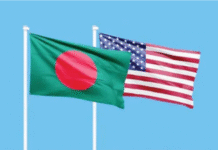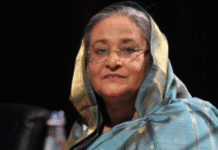
Troops parade for Queen Elizabeth II as she arrives in Kingston, Jamaica, in 2002.
PA Images via Getty Images
Queen Elizabeth II’s death has garnered a spectrum of feelings around the world about her life, legacy and the monarchy.
When she took the throne in 1952, more than a quarter of the world’s population was under British imperial power. That was more than 700 million people — including in parts of Africa, Asia, the Middle East and the Pacific islands.
While her 70-year reign saw the British Empire become the Commonwealth of Nations — and the decline of the United Kingdom’s global influence — the scars of colonialism linger. Many note the enslavement, violence and theft that defined imperial rule, and they find it difficult to separate the individual from the institution and its history.
Moses Ochonu, a professor of African studies at Vanderbilt University, told NPR the queen’s death brought attention to “unfinished colonial business.”
“There is a sense in which Britain has never fully accounted for its crimes,” Ochonu said.
Elizabeth was associated with colonial and de-colonized Britain
The memory of Elizabeth is complicated by the fact that during her rule, more than 20 countries gained independence, Ochonu said.
“It’s her dual status as the face of colonialism, but also a symbol of decolonization that defines how she is perceived in many former British African colonies.”
Ochonu’s own feelings toward the queen’s death are mixed — in part because of his childhood. He was born in Nigeria, a little over a decade after the country saw an end to colonial rule.

Queen Elizabeth II and Prince Philip wave from an open Land Rover to a crowd of schoolchildren at a rally held in Nigeria in 1956. The country would gain independence four years later.
Fox Photos/Hulton Archive/Getty Images
But coupled with that nostalgia is “residual anger” over the brutal price paid for many countries’ independence. Ochonu said in Nigeria, many are still haunted by Britain’s role in their civil war, when the global power secretly tried to prevent the Republic of Biafra’s secession efforts. In Kenya, Britain tortured thousands of rebels in detention camps, for which it apologized in 2013.
That’s why Ochonu said her death prompts a time of reflection rather than mourning.
Elizabeth was a symbol of Britain’s denial for colonial crimes
Others find it difficult to celebrate the queen’s life — in part because they feel she should be held accountable for what her country did.
“We essentially have to respect her for her very long service, but as the monarch, she cannot be disentangled from colonization of South Asia,” Mou Banerjee, a professor of South Asian history at the University of Wisconsin-Madison, told NPR.
Banerjee is from India, which gained independence from Britain in 1947. Although Elizabeth was crowned five years later, Banerjee said many Indians hoped the queen would express remorse for the damages of colonialism.
That was the case in 1997 during what would be the queen’s last visit to India. Elizabeth told Indians “history cannot be rewritten” in reference to the 1919 massacre in Jallianwala Bagh, where hundreds of Indians were shot and killed by British troops.
Those sentiments have resurfaced as many wonder what will happen to the queen’s crown jewel following her death. During colonial times, India was forced to hand over the 105-carat Kohinoor diamond to Britain. Many are also calling for the return of the Cullinan diamond back to South Africa.
“The jewels represent a history of coercion, subjugation, loot, loss, grief,” Banerjee said.
Similarly, the queen’s death has also reminded many people of the lack of reparations to former colonies.

People calling for slavery reparations protest outside the entrance of the British High Commission during the visit of the Duke and Duchess of Cambridge in Kingston, Jamaica, earlier this year.
Ricardo Makyn/AFP via Getty Images
Opal Palmer Adisa, the former director of the Institute for Gender and Development Studies at the University of the West Indies, told All Things Considered Britain has yet to even apologize to the African diaspora.
Over 2.2 million enslaved people were taken to British colonies in the Caribbean.
Palmer Adisa said in Jamaica, children were not taught specifics about what happened under British rule — even when discussing slavery.
“The implications and the horrendous actions of the British … were never delineated,” she said.
Many people are wondering why the British monarchy still exists
For some, the queen’s death has reignited conversations around the purpose and place for a monarch today.
Banerjee has been skeptical of the crown from a young age, when she would hear her grandparents’ anecdotes of the Bengal famine of 1943, where at least 3 million people died of starvation as a result of Britain’s overseas economic policies.
Although Elizabeth’s eldest son now sits on the throne, Banerjee believes this can still be a time of reckoning over the institution.
“They say, the sun never sets on the British Empire. I think it has set with the death of Queen Elizabeth,” Banerjee said.
“It is time that we come to terms with that history of enslavement, that history of colonization.”











